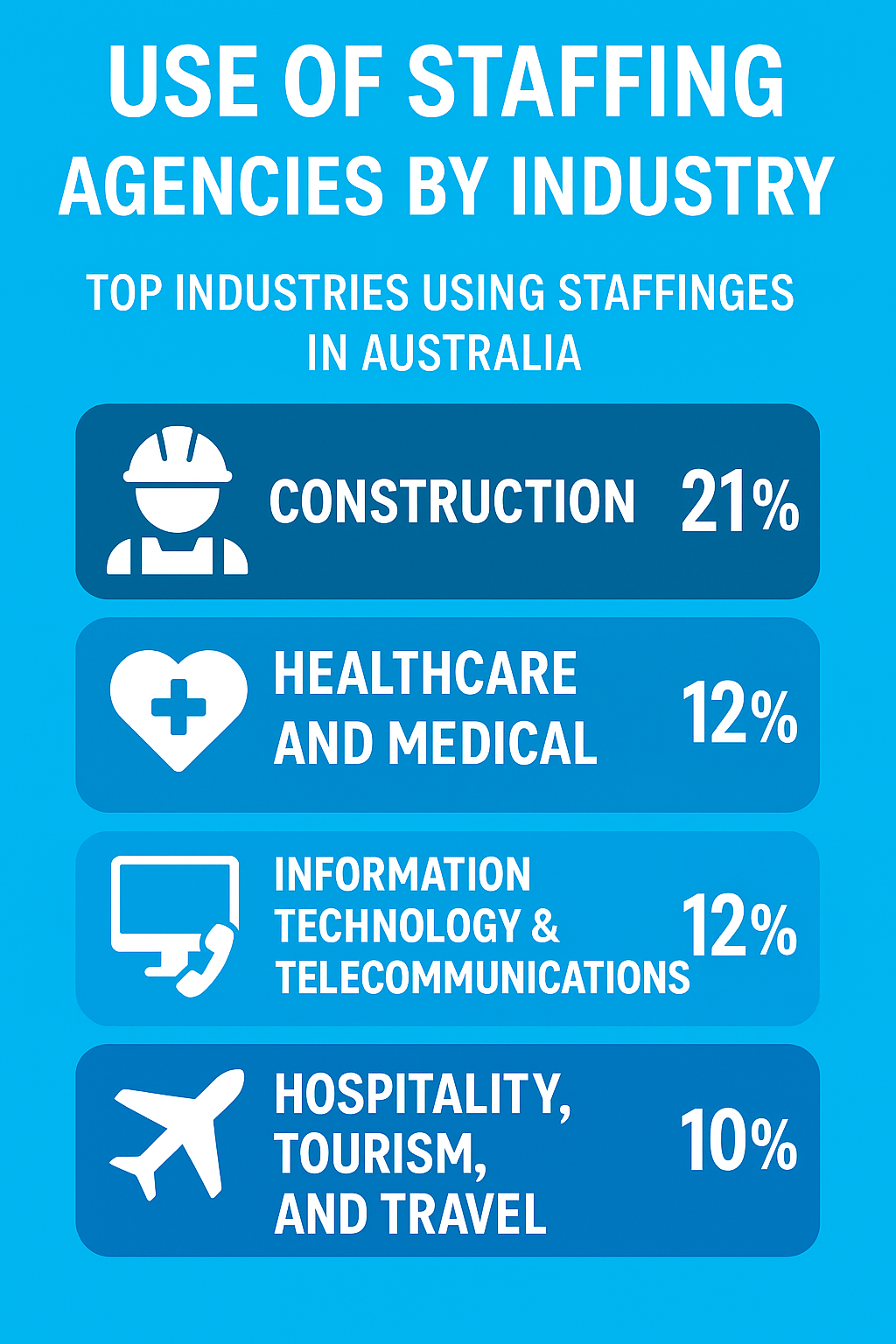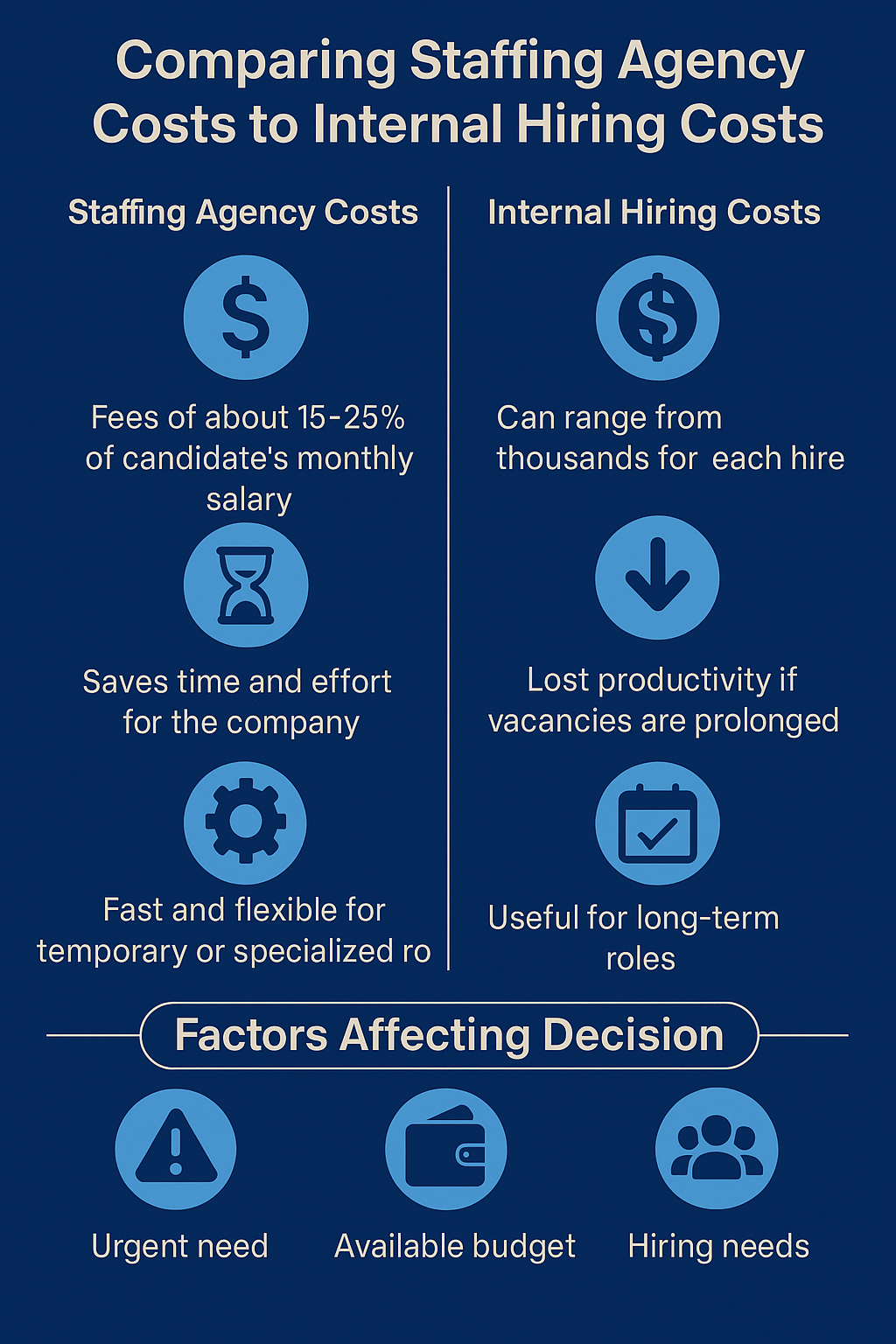Staffing Agencies Charge: Understanding The Cost Of Using Staffing Agencies
For successful staffing agencies, generating enough income to pay business expenses and still allow enough markup per contract to keep making a profit is a dual requirement. A staffing agency connects businesses with qualified candidates for temporary, permanent, and contract roles, streamlining the hiring process. They help companies find the right talent while supporting job seekers in securing suitable employment opportunities.
"Before we discuss the actual charge, let us look into some variables that are taken into consideration while deciding on a fee by staffing agencies. For temporary staffing, agencies charge a markup of between 15% and 50% of the worker's hourly wage. In direct-hire placements, a lump sum is charged as recruitment fees ranging from 15% to 30% of the monthly salary of the employee. Finally, contract-to-hire positions may take into account both structures, whereby some fees go towards recruiting and others go towards contracts.
Factors such as industry specifics, the complication of the jobs, and agency goodwill would affect cost estimates. Although these fees might seem high, they generally will allow the company to benefit from quick hiring, access to the best talent, and administrative support; thus, staffing agencies would be a cost-effective recruitment strategy." This staffing agency's charge guide will explain everything to you completely.
Common Payment Methods Of Staffing Agencies And Their Pros And Cons
Depending on the type of hire, staffing agencies implement various payment structures and methods. The following are the most common methods, along with their pros and cons:

1. Hourly Billing
How It Works: In an hourly billing system, the agency charges a markup on a worker's hourly wage.
Pros:
- Transparent cost structure.
- Scales with workload fluctuations.
- Suitable for temporary and contract staffing.
Cons:
- It can become expensive over time.
- Employers have no cost certainty in advance.
2. Fixed Fee (Flat Rate)
How It Works: The agency usually charges a flat fee for recruitment, which is a percentage of the employee's salary.
Pros:
- Predictable cost.
- Perfect for permanent placement.
- No continuing expenses.
Cons:
- High upfront cost.
- No flexibility if hiring needs change.
3. Retainer Model
How It Works: The client pays an upfront fee for the exclusive recruitment service of the agency.
Pros:
- Prioritized service.
- Best for executive searches.
- Commitment from the agency is assured.
Cons:
- Expensive regardless of outcome.
- Inappropriate for urgent hiring.
4. Temp-to-Hire Model
How It Works: A worker is hired temporarily under consideration for a more permanent employment position.
Pros:
- Reduces hiring risk.
- Cultural fit is assured before commitment.
Cons:
- Higher costs in terms of short-term employment.
- Confirms delay in employing permanent staff.
5. Payrolling Services
How It Works: The agency runs payroll while the company handles daily tasks.
Pros:
- Reduced administrative burden.
- Good for surveilling contract workers.
Cons:
- Fees are charged for this extra service.
- Less direct control over payroll.
Each system by staffing agencies caters to different business needs: thus, the best system comes down to hiring objectives and financial constraints.

Profiles Pricing Model
Most of the prices associated with profiles are dependent on the type of service and the industry. Some of these most common structures include:
- Subscription-based - The user pays a certain amount of money on a monthly or yearly basis for access to a profile database. It avails itself and is highly sought when it comes to hiring and networking platforms.
- Pay per View - Users are charged for every profile accessed. It is mostly used in background checks/per professional directories.
- Freemium Model - Provides free access to basic profile information but charges additional fees for premium access, such as obtaining contact data or using advanced filter characteristics. Job portals and dating apps are good examples.
- Commission-Based - Staffing agencies take a certain percentage from every transaction carried out through these profiles, which are facilitated by that profile; for instance, freelance marketplaces or influencer networks.
- One-Time Purchase - These services tend to sell profiles or reports; in that case, you would mainly find them in lead generation and executive search services.
- Tiered Pricing - This model consists of multiple access levels, which feature differences from free, limited searches to advanced paid filters or bulk access.
Pros and Cons
- Pros: It means putting forward flexible options for covering the multifaceted needs of businesses optimally, intending thereby to maximally utilize their incomes.
- Cons: It costs a whole lot for frequent users, or has bottlenecks in getting information access locked behind paywalls.
The appropriate pricing model could also differ depending on within-user demand, goals of the agency, and industry standards.
Additional Staffing Agencies Services And Fees
Simply put, the staffing agencies act as a middleman in recruitment. They have different prices, depending on what kind of services they're providing, the sector, and how the contract is based. Below are some of the major staffing services and their costs:
Recruitment Services
Recruitment agencies find suitable candidates for businesses for various positions. They provide:
- Permanent Placement: These agencies charge a one-time fee, usually 15-30% of the candidate's monthly salary for one permanent placement.
- Temporary Staffing: The businesses pay per hour to the employee, which includes the payment of the employee by the agency plus a markup of 25-60% for services of the agency.
- Executive Search: For Headhunting for Senior roles, the fee is 20-40% of the salary of the executive, often in installments.
Employment Services
- Labour Management: Payroll and compliance:
- Employer of Record (EOR): Handles HR and payroll, and compliance for offshore hiring with a charge of $200 to $500 for each person every month.
- Contract Staffing: Charges the agencies on short-term hiring with a markup of 20%-50% on wages of staff.
- Payroll Services: Some agencies process payroll for $50-$200 per employee monthly.
Services for Job Seekers
Most agencies charge businesses, but some have fees for job seekers:
- Resume Writing & Coaching: The price for professional resume writing and interview coaching is between $100 to $500.
- Career Placement Assistance: Only some of the high-end services cost around $500-$3,000 for individualized job search help.
You should, however, look into comparisons regarding what the agencies provide and the related costs to find the best offers bilaterally.
Are Staffing Agencies Worth It?
Staffing agencies prove themselves beneficial for businesses as well as for job seekers, as the real worth of such agencies depends on many factors varying from hiring need, industry type, and budget. Here's what makes staffing agencies worthy:
To Employers:
- Time-Saving Recruitment – They take care of everything from job postings, screening resumes, and interviews, which significantly cuts down the time taken to hire someone.
- Wider Talent Pool Access – They have extensive concentrated databases of candidates, ensuring their search is quicker than access to individual databases.
- Expertise in Hiring – Specialized agencies are supposed to keep a good track of the latest trends in their respective industries, which would make it easier to get the most suitable candidates.
- Reduced Risks in Hiring – Companies can evaluate an employee in a temporary position before actually hiring them permanently.
- Cost Efficiency – Because the agency itself is responsible for job advertising, a few background checks and assistance in onboarding will therefore be reduced.
- Scalability – Adjusts workforce according to fluctuations in periods of demand or project-based needs.
- Compliance and Legal Support – Completion of employment laws, tax regulations, and contracts
- Lower Employee Turnover – Most quality recruitments can result in reduced turnover.

For Job Seekers:
- Increased Speed to Employment – The agency connects the candidate to several employers and thus increases the chances of the candidate being hired.
- Access to Hidden Jobs – Some companies prefer going through recruitment agencies for hiring new employees, which means that many openings are not listed.
- Career Counseling & Training- Help in preparing a good resume, interviewing skills, and skill training.
- Clear Working Scheme: Temporary and part-time contract jobs are available with various terms.
- Negotiating Better Salaries/ Employee Benefits: Agencies negotiate for better salaries and employee benefits.
- Minimum Efforts in Searching for Jobs: No more extensive applications and back and forth with employers.
Staffing agencies make valuable investments in business-to-business relationships with companies and individuals investing in them for streamlined processes of hiring. Their expertise, efficiency, and extensive networks that they hold in the market make this agency a strategic asset in recruitment for organizations.
Comparing Staffing Agencies Costs To Internal Hiring Costs
The cost structures for staffing agencies and internal hiring differ significantly.

Agencies typically charge fees of about 15–25% of the candidate’s monthly salary for recruitment, screening, and onboarding. While this may seem like a lot of money, it saves the company time and effort. Internal hiring costs range from advertising the job to salaries for HR people, background checks, and training, which can come to thousands one way or the other for each hire. And if things stretch out and vacancies exist for prolonged periods, lost productivity will be an issue.
Internal hiring might be useful for filling long-term roles. On the other hand, agencies are fast and flexible in dealing with temporary or specialized roles. The factors affecting this decision are urgent need, available budget, and hiring needs. While agencies ease the recruitment burden, internal hiring gives a company total control over selecting its candidates and over the costs involved.
Conclusion
Costs of staffing agencies differ according to industry, job type, as well as contract duration. In most cases, fees apply between 15%-30% of a candidate's monthly salary for permanent recruitment, while those hired as temporary workers would have their hourly rates calculated according to applicable markup. Knowledge of these costs is crucial for businesses making informed hires, yet still managing their budget and workforce needs efficiently.









